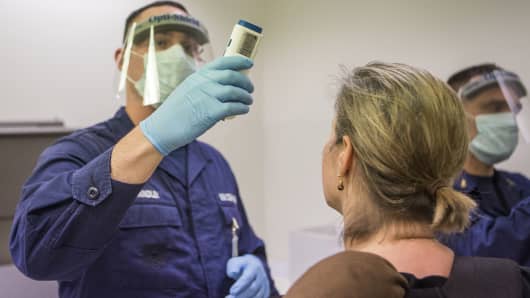Executives in visible positions are the dartboards for all of the dissatisfaction their followers feel. Dr. Thomas Frieden, the Center for Disease Control and Prevention (CDC)'s director, has had a massive dose of this lesson in recent months. The Ebola virus has made him the bullseye on the dart board for the media, the health-care industry, Ebola victims around the world, and anyone discontent with health care in general. But laced in between these irrational complaints are threads of truth Frieden, and other leaders like him, must heed if they are to remain effective and credible in the face of public scrutiny.
The CDC is widely held up as the nation's keeper of our health and guardian against the spread of infectious diseases. They are presumed to be on the scientific know-it-alls and to stand guard against all national health threats. What Frieden and the CDC failed to understand is that when you are deemed the definitive expert, you are, by extension, a target. Most executives fail to prepare for such scrutiny. Presuming their positional and expert authority will simply prevail as credible, many executives find themselves reeling when crisis — real or perceived – hits.. So how then can a high profile executive lead while dodging all of these darts?
Read MoreEbola furor erodes trust in the White House
Here are some hard lessons for executives in the face of incoming darts:
1. Play offense, not defense. Crisis definitely inspires action but is often just unhelpful and frenetic reaction. Once we move past the Ebola crisis, there will be another one, and the CDC needs to prioritize its resources now and align them against predictable threats. The CDC has been painfully scrutinized for its lack of focus, having too wide a bandwidth in the interpretation of its mission, focusing on everything from obesity, to playground safety, to sodium intake. Some have referred to this as "predictive hindsight" — trying to figure out what might go wrong before it does. Back against the wall, the CDC has been scrambling to respond adequately to panic about Ebola. But when the stakes are high you must be on the offense, not back on your heels in defense.
Read MoreCDC board member: Here's the key to containing Ebola
2. Every. Word. Matters. Information is a currency, that when withheld, is deemed a misuse of power. By its own admission, the CDC said that strict protocols and education are a major source of prevention. Yet two health-care workers were blamed by the CDC for breaching the very protocols they'd not been trained in. Did Dr. Frieden intend to blame the victims? Likely not. But should he have anticipated his words could be interpreted that way? Absolutely. Managing information flow and message clarity in times of crisis is critical to minimizing panic among constituents. Be vigilant with your messaging.
3. Instill confidence in your decision making. Instilling confidence in the general populace, especially in times of perceived crisis, demands a clearly articulated set of criteria and rationale on which they are basing their decisions. Any hesitation erodes trust and fuels fear. This is especially true in an information rich society. Did everyone inside the CDC understand their role in the Ebola outbreak? Who got to allocate what resources? Did hospitals know how to access protocols? To avoid looking like you are making the rules up as you go, make sure your opening move is a definitive set of information that guides public perception, behavior, choices, and doesn't waver as inevitable scrutiny intensifies.
Read MoreWe don't need an Ebola czar: Jeffrey Sachs
4. Credibility comes through transparency, not expertise. The public critique of CDC's Ebola protocols aside, whether or not they were sufficient to shift from theory to application isn't the issue — it's whether or not they could sustain the confidence of the nation in a time of uncertainty and potential panic. Organizations, like the CDC, whose primary focus is "expertise," whose constituents rely on that expertise to make decisions, must manage reputation and influence as carefully as they manage their science. The CDC needs to take a dramatic leap from being a mysterious secret scientific group to being a more transparent organization that sustains the confidence and trust of the nation through proactive education, information sharing, and strategies that act in advance of crises instead of in response to them. Showing people how much you "know" makes you sound defensive and condescending, and therefore creates suspicion that you're hiding something. Owning what you don't know makes others trust more what you say you do know.
Leading in the face of perceived national crisis is undoubtedly an excruciating job. Sustaining the trust of your constituents who are already predisposed to distrust the government makes it that much harder. But if executives prepare for the inevitable harsh scrutiny that will come their way, they'll find they have to do much less dart-dodging.


